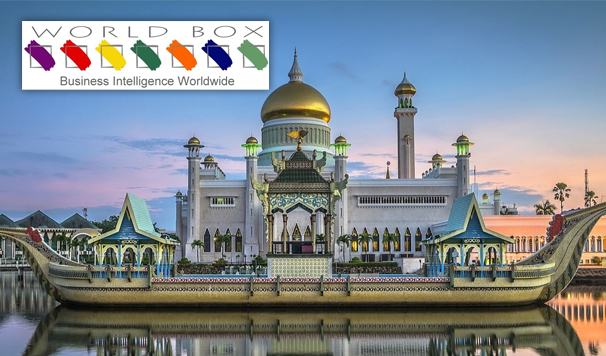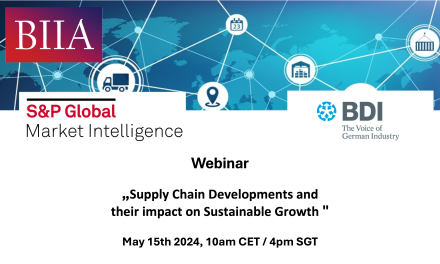Worldbox Business Intelligence Risk Rating – February 2024
BRUNEI
Summary
| Overall Risk Score 22 (Stable)
Political risk: Stable 8/10 Economic risk: Stable 7/10 Commercial risk: Stable 7/10 The risk assessment of a country is made up of 3 components, being Political, Economic and Commercial. Each component is scored out of 10 with 1 being the highest risk and 10 the lowest. |
ESG Risk: 8/10 (Stable)*
*Environmental, social and governance (ESG) issues are becoming increasingly important to companies, investors and consumers in Southeast Asia. That is why we are now preparing a separate ESG score and section with our quarterly country risk reports. We explain how each country rates, looking at the E, S and G individually, and outline recent developments. |
Political Risk – Stable at 8
Brunei is the smallest country in Southeast Asia with a population of 450,000. However, thanks to immense oil wealth, it is also one of the richest. Located on the island of Borneo and surrounded by Malaysia and the South China Sea, it is also politically stable. An Islamic sultanate, the Sultan of Brunei is both head of state and head of government and exercises absolute power over the country.
There are no elected representatives at the national level, while freedom of the press and assembly are significantly restricted. A legislative council with 36 appointed members is limited to a consultative role. Brunei operates two legal systems. A Common Law system has its origins in the English system and a Sharia Penal Code, running in parallel with the Common Law system. Around 80% of the population is Muslim. All senior judges are appointed by the sultan. However, according to Freedom House, the courts appear to act independently when handling civil matters.
There is little sign of dissent and the monarchy appears to enjoy popular support. The sultan has used the oil wealth to provide citizens with basic medical and dental services at no charge as well as free education and to invest heavily in developing infrastructure. There is no personal income tax. Citizens also enjoy heavy subsidies on fuel, electricity, water, rice, sugar and other staple foods.
Crown Prince Haji Al-Muhtadee Billah, 49, the eldest son of the Sultan of Brunei, is heir to the throne. Brunei maintains close ties with the USA, the UK, from which it gained independence in 1984, as well as Malaysia and Australia.
China is also increasingly influential. China has become Brunei’s largest trading partner, foreign investor and source of tourists. China is the biggest investor in Brunei’s port and petrochemical refinery, the country’s two major infrastructure initiatives. Brunei has become an enthusiastic supporter of China’s Belt and Road initiative.
Economic Risk – Stable at 7
Despite attempts at diversification, oil and gas remains the mainstay of Brunei’s economy. Oil and gas accounts for around 90% of Brunei’s total exports and just under two-thirds of the country’s GDP. Brunei has no sovereign debt, domestic or foreign. Brunei has the second highest GDP per capita in ASEAN, after Singapore, at around US$37,000 in December 2022.
The Brunei dollar is pegged to the Singapore dollar at a one-to-one ratio, and the Singapore dollar is legal tender in the Sultanate. The peg has provided the country with prudent monetary policy management from Singapore’s Monetary Authority of Singapore. Together with generous fuel and energy subsidies, this policy has helped keep inflation under control.
Brunei’s attempts to diversify the economy away from oil and gas production are focused on five priority sectors, downstream oil and gas industries, food, services, tourism, and information and communication technology. A well-educated and largely English-speaking population and an excellent infrastructure is helping to support these efforts.
In an Article IV assessment released in October 2023, the IMF reported that Brunei had begun to recover from the pandemic, with COVID-19 restrictions lifted and borders reopened in 2022. However, it added that the recovery had been hindered by reduced oil and gas production, despite rising commodity prices.
Commercial Risk – Stable at 7
Brunei is a middle-ranking country in which to do business, according to the World Bank, which ranked it 66th out of 190 in its 2020 Ease of Doing Business guide, behind Singapore, Malaysia and Thailand in Southeast Asia. The country continues to rank in first place, alongside New Zealand, in terms of “Getting Credit”. It ranked in 16th place worldwide for ease of starting a business. Moreover, significant improvements were seen in the local regulatory framework for the indicators on “Enforcing Contracts” and “Resolving Insolvency”.
Brunei also scores well in terms of corruption, ranking 38th out of 180 countries in Transparency International’s (TI) 2019 Corruption Perceptions Index. (There is no later ranking.) Only Singapore ranks higher than Brunei in Southeast Asia in 2019.
The Heritage Foundation ranks Brunei’s economy as being the 48th freest in the 2023 Index. Its score improved by 0.9 points over the year. Brunei ranks 9th among 39 countries in the Asia–Pacific region, and its overall score is above the regional and world averages.
The banking system remains stable, and risks appear contained, according to the IMF’s October 2023 Article IV report. The IMF said the capital ratio of banks is strong at around 20% of risk-weighted assets in 2022, well above regulatory requirements (10%). Gross non performing loans (NPL) as a share of total loan declined from 3.6% in 2021 to 3.3% in 2022, and NPL (net of provisions) to capital ratio rose from 4.9% to 5.5%, due to write-offs. Banks continue to have abundant liquidity funded mostly by domestic deposits.
February Bulletin
Political Risk – Stable at 8
There is little obvious threat to Brunei’s political stability. There is no credible opposition, the government controls the media and Sultan Hassanal Bolkiah, 77, remains popular and shows no sign of wishing to relinquish the throne. The succession of Crown Prince Haji Al-Muhtadee Billah, when the sultan does step down, seems assured. That should ensure continuity of government economic and social policy.
Living standards remain very high on a global and regional basis, and there is no sign of any significant opposition to the status quo. Brunei has close military ties with the US, the UK and Australia that continue to provide protection against any possible regional instability.
Economic Risk – Stable at 7
The ASEAN+3 Macroeconomic Research Office (AMRO) forecast in October 2023 that the economy would expand 1.1% in 2023 and 2.0% in 2024. Meanwhile, the ADB projects growth of 2.5% and 2.8%, while the IMF in its latest World Economic Outlook is forecasting an expansion of 3.3% and 3.5%.
AMRO revised Brunei’s 2023 inflation outlook from the previous estimate of 0.9% percent to 1.0%, while the 2024 inflation outlook was increased to 1.1%.
The labour market is improving, while challenges in hiring foreign labour are easing. The unemployment rate fell to 4.9% in 2021, the lowest since 1995. (there are, as yet, no later figures).
The IMF’s October 2023 Article IV consultation said key policy challenges include the narrowing fiscal space, the need to shield the economy against energy price and output volatility, global decarbonization pressures, and ensuring inter-generational equity.
Commercial Risk – Stable at 7
Allianz Trade (formerly Euler Hermes) rates Brunei as BB2 in its latest medium-term country risk rating. Malaysia is rated exactly the same, while Indonesia has a B1 rating.
In a July 2023 report, the central bank said that the banking industry continues to remain resilient with an aggregate Capital Adequacy Ratio of 21.3% as of Q1 2023. It added that in line with the increasing interest/profit rate environment an upward trend was recorded in the banking sector’s profitability.
Environmental, Social and Governance (ESG) – Stable at 8
The Sustainable Development Report from Cambridge University Press assesses the progress of all 193 UN Member States on the SDGs. It provides a useful means of ranking Southeast Asian countries on their ESG progress.
Brunei is ranked 102 out of 166 in the 2023 report with a score of 65.7.
Environment: With a humid climate and low-lying topography, Brunei is particularly vulnerable to climate change. According to climatechange.gov.bn, the nation’s coastal areas already lie ‘up to 12 metres below sea-level’, leaving Brunei at risk of frequent flooding. Meanwhile, wildfires have destroyed approximately 3.23 thousand hectares of forest cover in less than 20 years. Brunei’s heavy reliance on fossil fuels, which currently make up 99.9% of its total energy sources, is a huge contributor to its climate-related disasters.
On a brighter note, the Brunei government has released ten key strategies to combat climate change, which they hope to complete by 2035. Aptly named, ‘The Brunei National Climate Change Policy’, the initiative includes planting 500,000 new trees to mitigate the effects of deforestation, which contributed to an 11.2% loss in forest cover between 2001 and 2005. The Government also plans to increase its renewable energy share to 30%, up the use of electric vehicles to 60% and prompt a reduction in emissions within the industrial sector.
Social – Brunei emerges well from the US State Department’s annual analysis of human rights. The latest report states that there are no reports of political prisoners or detainees, or of disappearances by or on behalf of government authorities. It adds that the government generally respects judicial independence, and there were no known instances of government interference with the judiciary.
Governance – Brunei companies are generally well regarded in terms of governance issues as is testified by the low corruption rating – see Commercial Risk.
February Bulletin
Environmental, Social and Governance (ESG) – Stable at 8
A significant number of micro, small and medium enterprises are not aware of the ESG concept according to a report from the APEC Business Advisor Council Brunei branch. The report added that even when these enterprises were aware of ESG, they do not have a clear understanding of how to adopt ESG and sustainability practices.
Latest economic data

f forecasts
1 – Trading Economics
* Worldbox Intelligence
Source: IMF, except where stated
Useful links
https://www.transparency.org/en/cpi/2021
https://www.imf.org/en/Countries/BRN
About Worldbox Business Intelligence
Worldbox Business Intelligence, headquartered in Switzerland, is a Global API data solution provider of business intelligence and used in data analytics.
With the Global API solution Worldbox Business Intelligence enables clients and partners also a frictionless real time onboarding, KYC and compliance verification while rapid global investigations are provided, if needed.
Worldbox Business Intelligence provides global data in a standardised structure to more than 200 Million companies worldwide. The global network of subsidiaries, branches and desks allows to precisely and efficiently collect data and target key territories for clients and partners.”
“Worldbox Business Intelligence – Bringing Swiss Precision To Data”
Copyright (C) 2024 Worldbox Business Intelligence. All rights reserved.
Our mailing address is:
Worldbox Business Intelligence
Breitackerstrasse 1
Zollikon
Zurich 8702
Switzerland





























